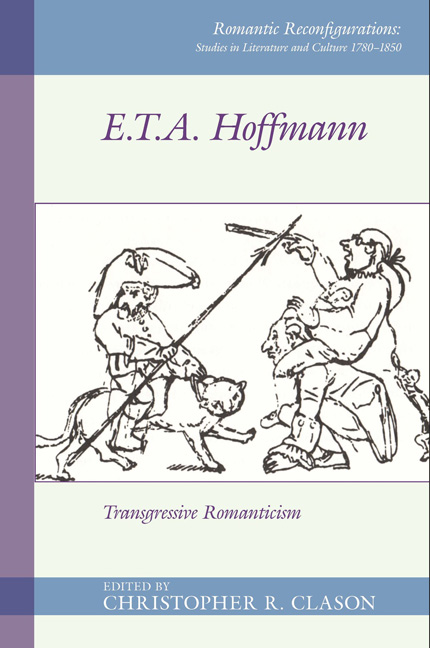Book contents
- Frontmatter
- Contents
- List of Figures
- Acknowledgements
- Notes on Contributors
- Introduction
- I Transgression and Institutions
- 1 “A Poor, Imprisoned Animal.” Persons, Property, and the Unnatural Nature of the Law in E.T.A. Hoffmann's “Das Majorat”
- 2 Vergiftete Gaben: Violating the Laws of Hospitality in E.T.A. Hoffmann's “Das Fräulein von Scuderi”
- 3 Transgressive Science in E.T.A. Hoffmann's Fantastic Tales
- II Transgression and the Arts
- III Transgression in the Märchen
- IV Transgression of Reception in Kater Murr
- Works Cited
- Index
3 - Transgressive Science in E.T.A. Hoffmann's Fantastic Tales
from I - Transgression and Institutions
- Frontmatter
- Contents
- List of Figures
- Acknowledgements
- Notes on Contributors
- Introduction
- I Transgression and Institutions
- 1 “A Poor, Imprisoned Animal.” Persons, Property, and the Unnatural Nature of the Law in E.T.A. Hoffmann's “Das Majorat”
- 2 Vergiftete Gaben: Violating the Laws of Hospitality in E.T.A. Hoffmann's “Das Fräulein von Scuderi”
- 3 Transgressive Science in E.T.A. Hoffmann's Fantastic Tales
- II Transgression and the Arts
- III Transgression in the Märchen
- IV Transgression of Reception in Kater Murr
- Works Cited
- Index
Summary
The GDR writer Franz Fühmann, in an effort to make Hoffmann compatible with East Germany's cultural politics, argued that Hoffmann was a realist, because his ghosts were real rather than illusory. Fühmann defined ghost (Gespenst) as something contrary to reason (“das rational zunächst Unbegreifliche” [Fühmann 229]), for instance, something that shouldn't exist – because it is in some way aberrant or anachronistic – yet does. The term ‘ghost’ was no doubt suggested to him by the wealth of supernatural effects in Hoffmann's fiction, yet ‘monster,’ meaning something that transgresses a norm, arguably fits his definition better. The two terms share the notion of transgression, but the first applies specifically to the laws of nature, whereas the second is broader in its applications. Fühmann's notion, thus qualified, offers an apt starting point for an exploration of scientists in Hoffmann's oeuvre: it draws attention both to their monstrosity and to the metaphorical nature of their supernatural associations. I will argue that transgression operates in two directions. First, science and scientists are most often monsters because they violate or transgress against nature; this is true of both mainstream, empirical and mechanistic science and of Romantic science, such as magnetism. Secondly, Hoffmann's portrayal of science is itself transgressive because it runs counter to and demonizes notions of scientific progress, again, both rationalist-empiricist and Romantic ones. The close parallels in the criticism of empiricism and Romanticism lead to a further hypothesis: Hoffmann perceives what one might call a scientific mindset, which runs deeper than, and thus undercuts any divisions into, rationalist and Romantic philosophies, and this mindset is the actual monstrosity his tales demonize. One could admittedly object that it is not the scientific mindset itself he wishes to critique, but rather perversions of it. Yet such a distinction may well be immaterial, since this mindset as conceived by Hoffmann is all too easily liable to perversion.
In attempting to define what is monstrous and transgressive about Hoffmann's scientists, it is useful to distinguish a surface level and a deeper, essential one, for which the former acts as a metaphor. Some keywords help to circumscribe the essential level: violation, violence, hubris, desire to dominate and possess.
- Type
- Chapter
- Information
- E. T. A. HoffmannTransgressive Romanticism, pp. 65 - 78Publisher: Liverpool University PressPrint publication year: 2018



